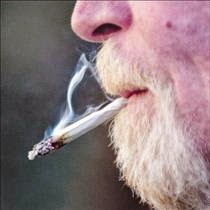Doctors denounce pot smoke
Sharon Kirkey, Postmedia News, August 21, 2014
They already opposed tobacco. Now the nation's doctors say Canadians shouldn't smoke "any plant material" whatsoever, including marijuana.
Delegates at the Canadian Medical Association's general council meeting voted Wednesday to formally oppose the smoking of any plant substance.

Opponents to the motion said it was a back-door way to ban medical marijuana. Some claimed it smacks of Prohibition all over again.
Taken literally, the blanket statement could cover dozens of plants that people smoke in different cultures.
But outgoing CMA president Dr. Louis Hugo Francescutti said smoking harms the lungs' "natural cleaning and repair system and traps cancer-causing chemicals" in the airways.
He cited a 2008 study by the American Chemical Society that found marijuana smoke contains many of the same chemicals as tobacco but in substantially higher levels.
Smoking marijuana may be more harmful than tobacco, partly because people often take "deeper, longer" puffs, said incoming president Dr. Chris Simpson.
The motion strengthens the CMA's opposition to marijuana for medical purposes, especially in its smoked form, he added.
The CMA has a policy supporting decriminalization of pot, "because we don't see the value of turning people who smoke marijuana into criminals," Simpson later told reporters.
On medicinal marijuana, the group's position is unequivocal, he said. "We are very sympathetic to the number of Canadians who tell us that they derive relief from marijuana. So we stand in solidarity with the patients," he said. "But our position is very clear: The evidence is insufficient to support its use as medicine."
Dr. Deborah Hellyer, a Windsor, Ont., respirologist said that smoking one joint "is equivalent to smoking 10 cigarettes."
But Dr. Ashley Miller of St. John's said the "prohibitionist" tone of the motion contradicts existing evidence and she worried about the cultural sensitivity.
Others at the meeting, held at the Ottawa Convention Centre, worried what message defeating the motion would send to the public.
"If we don't support it, it says, 'Smoke whatever you want' and I think that's a really bad message to send to the public," said Calgary physician Dr. Robin Cox.
http://www2.canada.com/edmontonjournal/news/story.html?id=21e3c8e6-3e0b-4e1a-904e-44f3c185a236&p=1
Related news:
Chris Simpson: Why the CMA chose not to participate in the government’s anti-pot campaign